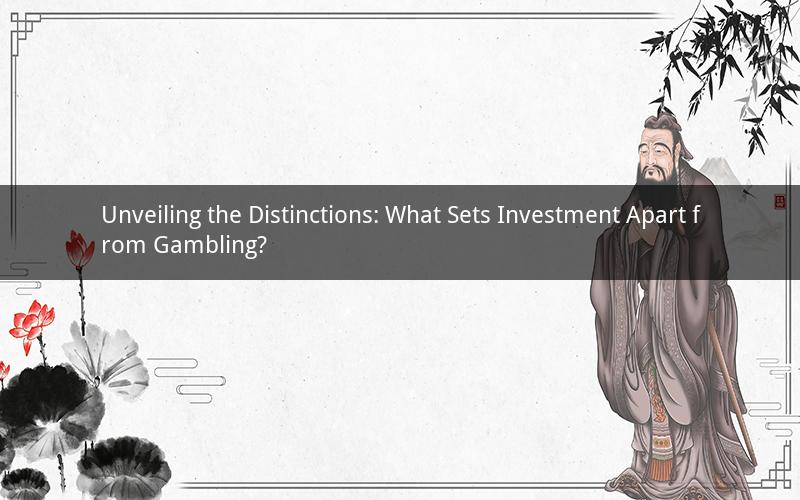
Investment and gambling are two distinct concepts that often intertwine in popular discourse. Despite their similarities, they are fundamentally different in nature, purpose, and potential outcomes. This article delves into the nuances that differentiate investment from gambling, providing a comprehensive understanding of each term.
Investment is the act of allocating resources with the expectation of generating an income or profit. It is a strategic process that involves thorough research, analysis, and planning. On the other hand, gambling is the act of betting money or something of value on an event with an uncertain outcome, typically with the primary intent of winning money.
The primary difference between investment and gambling lies in their objectives. Investors seek long-term growth and stability, while gamblers focus on short-term gains. Investments are made with the intention of holding them for an extended period, allowing the invested capital to grow over time. Gamblers, on the other hand, are more interested in the immediate gratification of winning a substantial sum of money.
Here are some key distinctions between investment and gambling:
1. Risk and Reward
Investment involves a degree of risk, but it is typically lower than that associated with gambling. Investors conduct thorough research and analysis to minimize potential losses, while gamblers often rely on luck and chance. The potential for reward in investment is generally higher than in gambling, as it is based on sound strategies and market trends.
2. Timeframe
Investment is a long-term endeavor, whereas gambling is often a short-term activity. Investors are prepared to wait for their investments to mature and yield returns, while gamblers are looking for immediate gains. The long-term nature of investment allows investors to ride out market fluctuations and benefit from compound interest.
3. Strategy and Planning
Investment requires careful planning and strategy, as it involves analyzing market trends, economic indicators, and financial statements. Gamblers, on the other hand, typically rely on intuition or a hunch. This lack of strategy can lead to impulsive decisions and potential financial losses.
4. Capital
Investment capital is usually acquired through savings, retirement accounts, or borrowing, and is intended to grow over time. Gamblers often use money that they can afford to lose, which can lead to financial strain and addiction.
5. Legal and Ethical Considerations
Investment is subject to various legal and ethical regulations, ensuring fair and transparent practices.Gambling, while also regulated in many jurisdictions, can be more susceptible to corruption and fraud.
To further illustrate the differences between investment and gambling, let's consider a hypothetical scenario:
Imagine a person who has $10,000 to allocate. They can choose to invest the money in a diversified portfolio of stocks, bonds, and real estate, or they can spend it on lottery tickets.
If they choose to invest, they will likely conduct research, analyze market trends, and consult with a financial advisor. They will set realistic goals and timelines for their investments, understanding that it may take several years to see significant returns. This person is prepared to ride out market downturns and maintain a long-term perspective.
In contrast, if they choose to gamble, they may buy lottery tickets without any research or strategy. They may spend their entire $10,000 on a single ticket, relying solely on luck. This person is more likely to experience financial strain and may develop a gambling addiction.
Now, let's address some common questions about the differences between investment and gambling:
1. Can investment be considered a form of gambling?
Investment can be compared to gambling in some aspects, such as the element of risk and uncertainty. However, investment is generally more structured and strategic, aiming for long-term growth rather than short-term gains.
2. Is it possible to make money through gambling?
Yes, it is possible to make money through gambling, but the odds of doing so are typically low. Most gamblers will lose money over time, while successful investors are more likely to achieve long-term financial stability.
3. Can investing be risky?
Investing can be risky, especially when it comes to high-risk assets like stocks and bonds. However, with proper research, diversification, and risk management, investors can mitigate potential losses.
4. Is gambling always unethical?
Gambling is not inherently unethical, but it can become problematic when it leads to addiction, financial strain, or other negative consequences. Responsible gambling involves setting limits and understanding the risks involved.
5. Can investing be addictive?
Investing can be addictive for some individuals, particularly when they experience the thrill of making profits or the fear of missing out on opportunities. It is essential to maintain a balanced approach and seek professional advice when needed.
In conclusion, the differences between investment and gambling are significant, as they reflect distinct goals, strategies, and outcomes. While both involve risk, investment is a long-term endeavor focused on growth and stability, while gambling is a short-term pursuit of immediate gains. Understanding these differences can help individuals make informed decisions about their financial future.